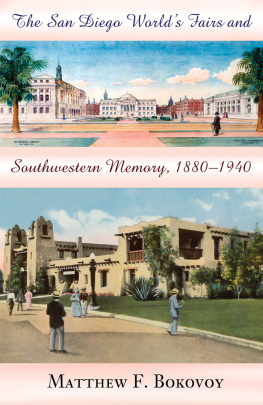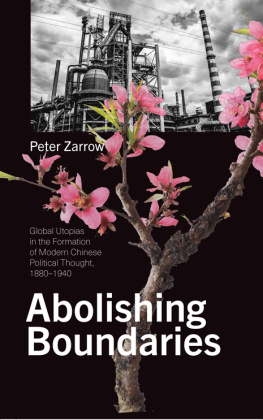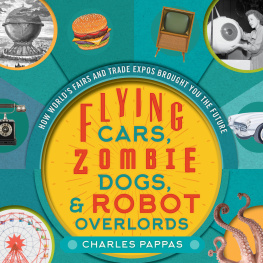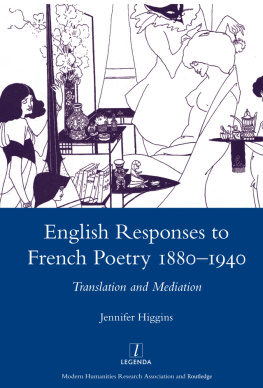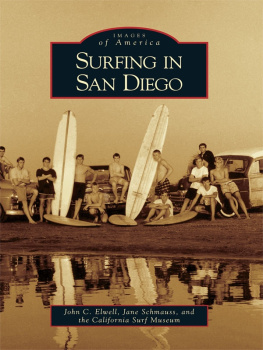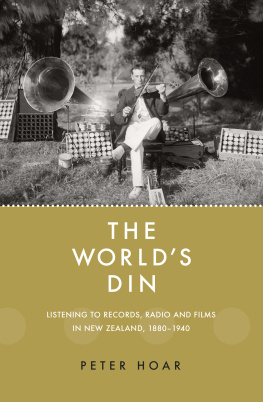ISBN for this digital edition: 978-0-8263-3644-6
2005 by the University of New Mexico Press
All rights reserved. Published 2005
Printed in the United States of America
The Library of Congress has cataloged the printed edition as follows:
Bokovoy, Matthew F., 1969
The San Diego Worlds Fairs and southwestern memory, 18801940 /
Matthew F. Bokovoy.
p. cm.
Includes bibliographical references and index.
ISBN 0-8263-3642-6 (cloth : alk. paper)
1. Panama-California Exposition (1915 : San Diego, Calif.)
2. Panama-California International Exposition (1916 : San Diego, Calif.)
3. California Pacific International Exposition (1935-1936 : San Diego, Calif.)
4. San Diego (Calif.)History20th century. I. Title.
T872.B1B65 2005
907.4794985dc22
2005012546
All illustrations provided courtesy of the San Diego Historical Society Research Archives (SDHS) and the San Diego Public Library, California Room Research Archives (SDPL).
Acknowledgments
THE IDEA FOR THIS BOOK began with a conversation at Gelato Vero Caf in San Diego in the winter of 1995. I wanted to write about my hometown of San Diego, especially the worlds fairs that had shaped its modern development. Ramn Gutirrez, a history mentor of mine since my dishwashing days at the caf, suggested, You should write a dissertation on the San Diego Expositions. No one has written about it. There are enough records for many books on the fairs at the San Diego Historical Society. I went to look at the records and nine years of research became this book. I thank Ramn and Lisbeth Haas, my teacher at University of California, Santa Cruz, for their friendship, good advice, and assistance with the history of California and the southwestern borderlands.
During the years I worked on this book there have been mentors, colleagues, and friends who have enriched the project through their sound advice. I thank my graduate advisors Allen F. Davis, Miles Orvell, Robert Schwoebel, William Cutler III, and Margaret Marsh. They encouraged me to continue work on a topic that was thousands of miles away. Allen Davis was always prepared to offer his time, usually over late-afternoon cocktails. His reputation as a fine writer, editor, and urban resident defines the publicly engaged scholar. He is a model for young historians. Carol Lilly, Todd Kerstetter, Thomas Clark, and Dean Michael Schuyler offered their support and assistance while I taught at the University of Nebraska, Kearney, in 19992000. Lynn Hollen Lees, Robert Engs, Warren Breckman, Ben Nathans, Barbara Savage, Michael Zuckerman, Ann Farnsworth-Alvear, Sheldon Hackney, Walter Licht, and Eric Cheyfitz generously welcomed me to the intellectual life at University of Pennsylvania in 20002001. I thank Bob for professional advice and lunch, Ann for inviting me to participate in the ethnohistory seminar, and Warren for his deep knowledge of European social theory and how it applied to my project. Much of the rewriting of this book took place while I taught at Oklahoma State University from 2001 to 2004. Lester George Moses generously offered his time, deep knowledge of southwestern archival collections, and friendship. I thank him for bringing me to Oklahoma. Elizabeth Williams helped me through the difficult field of nineteenth-century European anthropology. Department chair William Bryans lent consistent support and encouragement. Joseph Stout helped with the style and substance of the manuscript. Ron Petrin, Mike Smith, Jason Lavery, and Lesley Rimmel always supplied criticism that deepened my understanding of the historical process. My friend Michael Willard read many drafts of this book and offered numerous suggestions based on his immense knowledge of American Studies scholarship. Oklahoma State History Department graduate students, including Mark Van der Logt, Jim Klein, Todd Leahy, Marcy Gracey, Jeffrey Christensen, Aaron Christensen, Adrian Sadovsky, Deanna Fischer, Kelly Crews, Rodney Jones, and Steven Karr, raised the level of intellectual life in Stillwater.
Many archivists have contributed to this project. Archivists and staff members at the San Diego Public Library and San Diego Historical Society deserve particular mention. I thank Rick Crawford, the former director of archives at SDHS and now at the California Room of the San Diego Public Library, for years of assistance, advice, and encouragement. I thank Eileen Boyle, Derek Moses, Jane Selvar, Sydney Larrime, and Billie Stack at SDPL. At SDHS, Sally West, Tony Arambarri, Rick Crawford, and the curators of the Photographic Department were superlative. I especially appreciate the assistance of archives director John Panter, his assistant Dennis Sharp, and Gregg Hennessey, the editor of the Journal of San Diego History. At the American Philosophical Society, the late director Edward Carter II, archivist Rob Cox, and fellow Lee Baker enriched my time there. Lee Baker went out his way to help me with the history of anthropology. I thank the generosity of the staff at the National Anthropological Archives, Smithsonian Institution; the Bancroft Library at the University of California at Berkeley; the Laboratory of Anthropology, Museum of New Mexico; the Southwest Museum; and the Western History Collection at the University of Oklahoma. John Phillips, the director of government documents at the Edmon Low Library at Oklahoma State University, shared his enthusiasm and knowledge of government publications to make this a better book.
Numerous mentors and colleagues provided me with their own points of view and answered my sometimes sophomoric questions. Thanks are due to Virginia Scharff, Chris Wilson, Paul Hutton, Jane Slaughter, David Farber, Beth Bailey, and Margaret Szasz of the University of New Mexico for their consistent support. Durwood Ball taught me much about writing and editing. David Holtby of UNM Press has been a source of ongoing support. Paul Vanderwood took care and time to guide me through the revisions. I thank Paul for transforming me into a writer. Michael J. Gonzlez urged me to consider the legacy of Helen Hunt Jackson. George Stocking Jr. graciously encouraged me to reexamine the Czech-Bohemian ethnicity of Ale Hrdlika and his place in American anthropology. William McClung offered good words of encouragement. For their scholarship and professional endeavors I have been inspired by William Deverell, David Wrobel, Lisa Rubens, Kathy Howard, Julie Berebitsky, Rodney Hessinger, John McNay, Molly Mullin, Dewar and Deirdre MacCleod, Ross Frank, Mark Haller, Eric Avila, Phoebe Kropp, and Erica Bsumek. Finally, I thank Mike Davis and Alessandra Moctezuma, and Jim Miller and Kelly Mayhew for opening their homes to me in San Diego. They made the completion of this book much more enjoyable with their warmth and worldliness.
Writing a book in the university setting can be an alienating experience without friends outside the business. Many kept my spirits up when I thought about giving up the history enterprise altogether. They reminded me that life is not simply defined by work. Michael Martin, Dave Lorenz, Paul Dellavigne, Chris Ogilve, Eric LaValle, Jen Streeper, and Rich Alfonse took me to local bars for pool, bourbon and beer, and human conversation about the real world. Dave humored me with his theological rants and gifted bass playing. The local crew at Andys Bar, Girard Avenue and Orianna Street, Carlos and Will Sanchez, Doug, Nelson, Steven, Eppy, and Rob, offered a warm atmosphere. They directed me toward community organizations in North Philly. Alan Hewitt and Erin Elstner lured me from Philadelphia to New York City for cultural enrichment when I lost enchantment with life. In the San Francisco Bay Area, my childhood friends Garrett Scott and Kasey Kolassa let me stay on their couches and talked late into the evening with me about the problems of contemporary California. In Stillwater, Luke Dunham, Brad Hayes, Aaron Frisbee, Mike Willard, and George MacPherson helped me loosen up as they enticed me away from writing to tear up the public skateboard parks of Oklahoma.



